|
|
|
Sort Order |
|
|
|
Items / Page
|
|
|
|
|
|
|
| Srl | Item |
| 1 |
ID:
095378


|
|
|
|
|
| Publication |
2010.
|
| Summary/Abstract |
Does membership in Intergovernmental Organizations (IGOs) affect states' human rights behavior? One might expect IGOs with a specific human rights mandate, like the International Labour Organization or the Council of Europe, to have a positive effect on the human rights practices of their member states. But what about other sorts of IGOs, particularly those with no direct connection to human rights issues? This study employs cross-national data on abuses of "physical integrity rights" for 137 countries over the period 1982-2000 to test the hypothesis that IGOs can promote the diffusion of human rights norms by providing venues for interstate socialization. Recent empirical work on IGOs has suggested that this sort of socialization effect can play an important role in promoting democracy and can also lead to a more general convergence among states' interests. The results presented here suggest that IGOs can have a surprisingly powerful influence on states' human rights practices as a result of this process.
|
|
|
|
|
|
|
|
|
|
|
|
|
|
|
|
| 2 |
ID:
095373
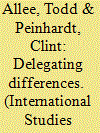

|
|
|
|
|
| Publication |
2010.
|
| Summary/Abstract |
Bilateral investment treaties (BITs) have become the dominant source of rules on foreign direct investment (FDI), yet these treaties vary significantly in at least one important respect: whether they allow investment disputes to be settled through the International Centre for the Settlement of Investment Disputes (ICSID). Through the compilation and careful coding of the text of nearly 1,500 treaties, we identify systematic variation in "legal delegation" to ICSID across BITs and explain this important variation by drawing upon a bargaining framework. Home governments prefer and typically obtain ICSID clauses in their BITs, particularly when internal forces push strongly for such provisions and when they have significantly greater bargaining power than the other signatory. Yet some home governments are less likely to insist upon ICSID clauses if they have historical or military ties with the other government. On the other hand, although host governments are often hostile toward ICSID clauses, particularly when sovereignty costs are high, they are more likely to consent to such clauses when they are heavily constrained by their dependence on the global economy. Our findings have significant implications for those interested in FDI, legalization, international institutions, and interstate bargaining.
|
|
|
|
|
|
|
|
|
|
|
|
|
|
|
|
| 3 |
ID:
095374
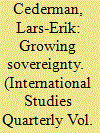

|
|
|
| 4 |
ID:
095381
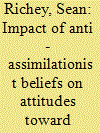

|
|
|
|
|
| Publication |
2010.
|
| Summary/Abstract |
I outline different beliefs about assimilation, and show that these beliefs can influence attitudes toward immigration. Using data from a new national sample survey in Japan, I test whether and how beliefs about assimilation influence attitudes toward immigration. The results show two important conclusions. First, there is a large anti-immigrant sentiment in Japan. Second, after controlling for other known determinants of attitudes toward immigration, I find that those who are in favor of immigrant assimilation support higher levels of immigration, more immigrant equal rights, and have more accurate views about immigrant crime in Japan. This suggests that those favoring assimilation are not necessarily xenophobic in all cultures.
|
|
|
|
|
|
|
|
|
|
|
|
|
|
|
|
| 5 |
ID:
095376
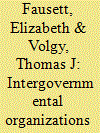

|
|
|
|
|
| Publication |
2010.
|
| Summary/Abstract |
While the relationship between intergovernmental organizations (IGOs) and conflict has captured the attention of international relations scholars for decades, the empirical results of this research agenda have presented contradictory conclusions regarding the pacifying effect normally attributed to IGOs. We address these contradictions by refocusing primarily on potential IGO effects on low-severity conflicts. We examine new states in the postcommunist space spanning Europe and Central Asia as a useful research site to explore these relationships in the post-Cold War era. We argue that especially in the case of newly emerging states, where there is little institutional memory and long-term experience in foreign affairs, IGOs expose differential policy preferences between members, and such information should be associated with the likelihood of increased low levels of conflict. We find a strong association between shared IGO membership and low severity conflict, a significant relationship between low and high severity conflict, and differences between IGO membership effects on low versus high severity conflict, consistent with our theoretical argument.
|
|
|
|
|
|
|
|
|
|
|
|
|
|
|
|
| 6 |
ID:
095375


|
|
|
|
|
| Publication |
2010.
|
| Summary/Abstract |
What explains the substantial variation in the International Monetary Fund's (IMF) lending policies over time and across cases? Some scholars argue that the IMF is the servant of the United States and other powerful member-states, while others contend that the Fund's professional staff acts independently in pursuit of its own bureaucratic interests. I argue that neither of these perspectives, on its own, fully and accurately explains IMF lending behavior. Rather, I propose a "common agency" theory of IMF policymaking, in which the Fund's largest shareholders-the G5 countries that exercise de facto control over the Executive Board (EB)-act collectively as its political principal. Using this framework, I argue that preference heterogeneity among G5 governments is a key determinant of variation in IMF loan size and conditionality. Under certain conditions, preference heterogeneity leads to either conflict or "logrolling" within the EB among the Fund's largest shareholders, while in others it creates scope for the IMF staff to exploit "agency slack" and increase its autonomy. Statistical analysis of an original data set of 197 nonconcessional IMF loans to 47 countries from 1984 to 2003 yields strong support for this framework and its empirical predictions. In clarifying the politics of IMF lending, the article sheds light on the merits of recent policy proposals to reform the Fund and its decision-making rules. More broadly, it furthers our understanding of delegation, agency, and the dynamics of policymaking within international organizations.
|
|
|
|
|
|
|
|
|
|
|
|
|
|
|
|
| 7 |
ID:
095380


|
|
|
|
|
| Publication |
2010.
|
| Summary/Abstract |
Why did some developing country governments accumulate large foreign debt burdens in the late twentieth century while others did not? I hypothesize that variation in foreign indebtedness is a product of the impact of regime type on government borrowing and investment decisions. Autocratic regimes will borrow more from foreign lenders and invest fewer of these funds in public goods than democratic regimes. Consequently, autocracies are more likely to develop large foreign debt burdens than democracies. I test this hypothesis by estimating error correction models against a sample comprising 78 developing countries between 1976 and 1998. The analysis suggests that autocratic governments accumulated substantially larger foreign debt relative to their national income than democratic governments. The analysis has implications for the likely consequences of contemporary debt relief initiatives.
|
|
|
|
|
|
|
|
|
|
|
|
|
|
|
|
| 8 |
ID:
095385


|
|
|
|
|
| Publication |
2010.
|
| Summary/Abstract |
This article addresses the influence wielded by the formal leaders of international cooperation-those state or supranational representatives that chair and direct negotiations in the major decision bodies of multilateral organizations and conferences. This is a topic that so far has received limited systematic attention by IR theorists, who have tended to treat bargaining parties as functionally and formally equivalent, leaving little theoretical space for formal leadership. Drawing on rational choice institutionalism, I introduce a theory that develops a coherent argument for the delegation of authority to the chairmanship, the power resources of negotiation chairs, and the influence of formal leaders over outcomes. I assess the explanatory power of this theory through evidence on formal leadership in three alternative organizational settings: the European Union, the General Agreement on Tariffs and Trade/the World Trade Organization, and the United Nations environmental conferences. I find in favor of the chairmanship as a source of independent influence in international cooperation. Formal leaders perform functions of agenda management, brokerage, and representation that make it more likely for negotiations to succeed, and possess privileged resources that may enable them to steer negotiations toward the agreements they most prefer.
|
|
|
|
|
|
|
|
|
|
|
|
|
|
|
|
| 9 |
ID:
095377
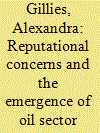

|
|
|
|
|
| Publication |
2010.
|
| Summary/Abstract |
This study argues that the reputational concerns of several high-profile actors drove the emergence of oil sector transparency as an international norm. Thanks to successful advocacy campaigns, developing country oil sector operations began to pose increasing levels of reputational risk to Western governments, international institutions, and corporations. These actors responded to this scrutiny by facilitating the evolution of transparency into a widely cited oil sector "best practice." However, the self-interests of these actors also altered the course of the norm's definition and institutionalization in ways which may constrain its eventual impact on industry behaviors. This study narrates the surprising and rapid spread of the transparency norm in developing country oil affairs, a process which suggests that reputational utility should be considered as a possible explanation for norm emergence.
|
|
|
|
|
|
|
|
|
|
|
|
|
|
|
|
| 10 |
ID:
095379


|
|
|
|
|
| Publication |
2010.
|
| Summary/Abstract |
The crisis bargaining literature sees demands as endogenous to crises. However, despite the parallels between military and economic coercion, sanctions researchers have preferred to analyze economic coercion after demands have been issued, and have not explored sufficiently the possibility that when senders formulate their policy objectives, they consider the international constraints imposed by the capabilities and interests of target states. I complement the sanctions literature by deriving the implications of strategic goal formulation in a game theoretic model of economic coercion that assumes endogenous demands. The model explains the inconsistent empirical relationship between sanctions costs and outcomes as well as the paradoxical tendency of senders to select into difficult disputes. I find that threats are not always more effective than sanctions and suggest what an optimal sanctions policy might look like.
|
|
|
|
|
|
|
|
|
|
|
|
|
|
|
|
| 11 |
ID:
095383
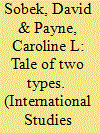

|
|
|
|
|
| Publication |
2010.
|
| Summary/Abstract |
Previous research has implicitly assumed that civil wars represent a coherent category of events, but given the variety of rebel goals that supposition seems tenuous. We split civil wars into those where the rebels simply want to remove the government (replacement) from those where the rebels want to alter the relationship between the state and society (legitimacy). Theoretically, states are most at risk for a civil war of replacement when they extract substantial wealth from society and the government is weak. In contrast, civil wars of legitimacy are more likely to occur in states where the rebels have both grievances and a means to maintain their future viability. An empirical analysis of civil wars of replacement and legitimacy from 1960 to 1999 confirms both our argument about the different types of civil violence and their differing causes.
|
|
|
|
|
|
|
|
|
|
|
|
|
|
|
|
| 12 |
ID:
095387


|
|
|
|
|
| Publication |
2010.
|
| Summary/Abstract |
The European state-building experience has led many scholars to argue that war forces states to increase their fiscal-administrative capacity, or what we might refer to as political development, in order to compete in the international system. War also requires states to generate wealth to support such competition, which should lead to progressively increased levels of economic development. Yet, in contemporary empirical studies, war is often studied as a dependent variable, with economic and political development modeled as affecting its origination. This reading of theory and empirical work suggests that war, economic development, and political development constitute an endogenous system. In this paper, we develop expectations about how these three processes interact and test them using a three-stage least squares regression model. The results show significant simultaneous relationships between the three processes. We conclude that war, economic development, and political development are mutually constitutive processes in the contemporary international system.
|
|
|
|
|
|
|
|
|
|
|
|
|
|
|
|
|
|
|
|
|